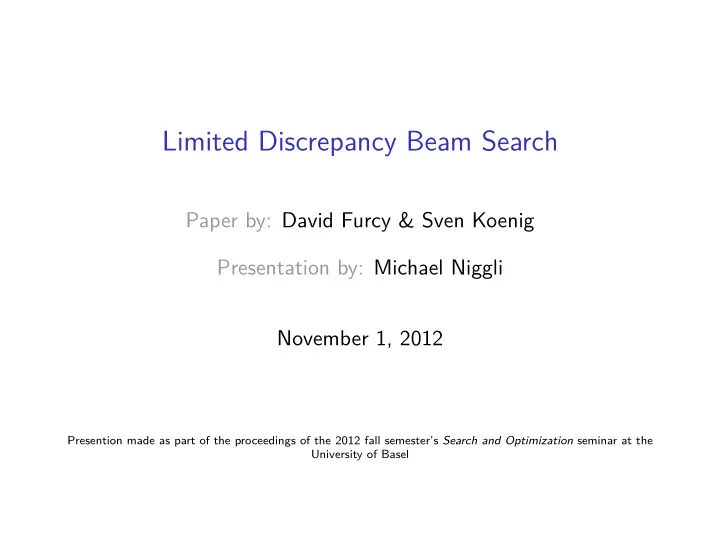

Limited Discrepancy Beam Search Paper by: David Furcy & Sven Koenig Presentation by: Michael Niggli November 1, 2012 Presention made as part of the proceedings of the 2012 fall semester’s Search and Optimization seminar at the University of Basel
Beam Search sacrificing completeness of b ) (or the searched space) • Optimization of Best-First search to reduce memory usage, • Build search tree using breadth-first • On each level: • Expand all successors for the current level’s states • Order by heuristic • Drop all but the best b successor states (yielding a beam width • Terminate upon reaching a goal state or exhausting memory
Beam Search . . S . Beam width = 2 . . . Nodes contained in the Beam . Nodes that were expanded, but pruned . Nodes that were not expanded at all
Beam Search (unsorted) . . S . Beam width = 2 . . . Nodes contained in the Beam . Nodes that were expanded, but pruned . Nodes that were not expanded at all
Beam Search vs. 48-Puzzle 5814061 500 2302.86 2899765 1148559 2.205 74 % 1000 1337.95 3346004 1331451 2.822 84 % 5000 481.30 2365603 b 5.500 86 % 10000 440.07 10569816 4312007 11.307 80 % 50000 N/A N/A N/A N/A 0% 86 % 2.296 1212579 3079594 Path length States generated States stored Runtime (s) Problems solved 1 N/A N/A N/A N/A 0 % 5 11737.12 147239 58680 0.09 100 % 12129.88 100 86 % 2.495 1266902 3211244 25341.44 50 100 % 0.601 362799 904632 36281.64 10 • Larger Beams → better solutions, higher memory consumption → not necessarily more solutions
• Backtracking to beam search circumvents this • Let’s call this Depth-first Beam search (DB) Improving Beam search solutions, smaller ones find longer paths • Goal: 100% of the puzzles solved, with shorter solutions paths • Varying beam width won’t work - larger beams find less • Misleading heuristic values prevent finding of a solution
Improving Beam search solutions, smaller ones find longer paths • Goal: 100% of the puzzles solved, with shorter solutions paths • Varying beam width won’t work - larger beams find less • Misleading heuristic values prevent finding of a solution • Backtracking to beam search circumvents this • Let’s call this Depth-first Beam search (DB)
Depth-first Beam search (DB) . . S .
Depth-first Beam search (DB) . . S .
Depth-first Beam search (DB) . . S . Note: Nodes are expanded a second time!
Depth-first Beam search (DB) . . S .
Depth-first Beam search (DB) . . S .
Depth-first Beam search (DB) to the goal there more often than further down the tree. • DB is very slow • Presumed reason: heuristics mislead early on rather than close • Idea: Revisit states closer to the start early; heuristics fail
Limited Discrepancy Search left value number of allowed discrepancies (until a solution is found) • Designed for finite binary trees • Successors are sorted by heuristic, the better option is always • A discrepancy is choosing right over left against the heuristic • Try finding a solution first without, then with increasing
Limited Discrepancy Search . . LDS without any allowed discrepancies
Limited Discrepancy Search . . LDS with 1 allowed discrepancy
Limited Discrepancy Search . . LDS with 1 allowed discrepancy
Limited Discrepancy Search . . LDS with 1 allowed discrepancy
Limited Discrepancy Search . . LDS with 1 allowed discrepancy
Generalized LDS under all non-best successors with a discrepancy of zero • LDS was for binary trees only • Use hash table for cycle detection in GLDS • Count going to a non-best successor as one discrepancy • A discrepancy of one thus allows us to search the sub-trees
BULB – Beam Search Using Limited Discrepancy . BULB . GLDS . LDS . DFS DB Backtracking . Beam Search . BFS . Influences between algorithms • GLDS combined with Depth-first Beam search • As in DB, we work with slices of states
BULB – Beam Search Using Limited Discrepancy . BULB . GLDS . LDS . DFS DB Backtracking . Beam Search . BFS . Influences between algorithms • GLDS combined with Depth-first Beam search • As in DB, we work with slices of states
Properties of BULB search tree depth d memory to find it) (better than Breadth-first search, which has max depth of • Memory consumption O ( Bd ) , with beam width B and max • Complete (we find a solution if one exists and we have enough • Being complete makes BULB better than Beam search • Maximum tree depth ~ M / B , where M is the available memory only log B M ) • Pretty fast (in experiments)
Experiments - N-Puzzle length of 440 instances! (B=5) times the shortest path • 48-Puzzle • BULB solves all instances with beam width 10000, avg. path • Regular beam search had avg. length of 11737 when solving all • 80-Puzzle, memory for 3’000’000 states • Not all 50 random instances solvable with Beam search • BULB does them all • Fastest run: 12 seconds, avg. path length ~181000 • Spending 120 seconds brings avg. path length of ~1130, just 5
Experiments - 4-Peg Towers of Hanoi 10’000) • 50 random instances with 22 disks each • Memory capacity for 1’000’000 states • Pattern DB as heuristic function • Not all solved by beam search • Fastest average run time with BULB: 1.5s (b=40) • b = 1000 takes 7s, but brings path length down to 870 (from
Questions? ?
Recommend
More recommend